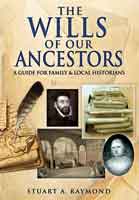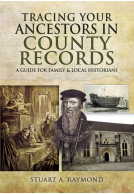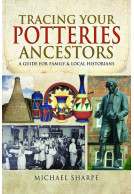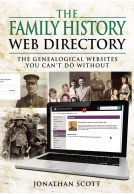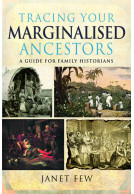Researching Local History (Paperback)
Your Guide to the Sources
Imprint: Pen & Sword Family History
Series: Tracing Your Ancestors
Pages: 240
Illustrations: 40 black and white illustrations
ISBN: 9781526779427
Published: 28th June 2022
(click here for international delivery rates)
Order within the next 6 hours, 16 minutes to get your order processed the next working day!
Need a currency converter? Check XE.com for live rates
| Other formats available | Price |
|---|---|
| Researching Local History ePub (9.1 MB) Add to Basket | £6.99 |
How has the place we live in changed, developed, and grown over the centuries? That is the basic question local historians seek to answer. The answer is to be found in the sources of information that previous generations have left us. The records of parish, county, and diocesan administration, of the courts, of the national government, and of private estates, all have something to tell us about the history of the locality we are interested in. So do old newspapers and other publications. All of these sources are readily available, but many have been little used.
Local historians come from a wide diversity of backgrounds. But whether you are a student researching a dissertation, a family historian interested in the wider background history of your family, a teacher, a librarian, an archivist, an academic, or are merely interested in the history of your own area, this book is for you. If you want to research local history, you need a detailed account of the myriad sources readily available. This book provides a comprehensive overview of those sources, and its guidance will enable you to explore and exploit their vast range. It poses the questions which local historians ask, and identifies the specific sources likely to answer those questions.
Stuart A. Raymond’s excellent new introductory study on local history sources is an excellent addition to the canon of local history reference works. A useful reference guide, this tome is well organised and structured and engages with up-to-date scholarship from key journals such as The Local Historian. It is an excellent addition to Pen & Sword’s ‘Family History’ series.
The Historic Society of Lancashire and Cheshire Newsletter - February 2023
Raymond’s book encourages us to think through problems and consider how we can pursue scholarly research through more effective and efficient use of our often-limited time. It is both a welcome primer and refresher for anyone wanting to think about the study of the past in the twenty-first century.
"I can heartily recommend the book as a consummate guide to all of us."
Cumbria FHS
"This book is written to support the genealogist. It is written in clear text, and provides a fascinating study opening new fields of research. I found the book highly informative and interesting reading."
Lincolnshire Family History Society
My first thought on receiving this book was ‘Do we need another book on how to do local history?’. Having read it, the answer is ‘Yes’.
The Local Historian - Journal of the British Association for Local History, April 2023,Volume 53 No 2
It is an excellent book to take a fairly new (but not novice) researcher straight to the repositories or guides to their area of interest. It cuts out the need for fruitless searching and wondering and is a great resource to have to hand to develop a project.
Hexham Local History Society (Hexham Historian Newsletter - Spring 2023))
If you need help and inspiration, this book will provide it.
With so many of us turning to local history and genealogy for answers to our family-backgrounds, it makes sense to use a guidebook like this one.
For the Love of Books
With plentiful resources and tips, as well as photographs included, I don’t think Raymond has overlooked anything.
An excellent writers’ resource as
well as a guide for the layperson. Recommended.
4.7 out of 5
Amazon Customer, Jayne
As a family historian, local history has long been an interest of mine. From buildings, former uses for land and structures, to maps and most especially churches and churchyards. I agree with the author that although there is a vast wealth of information on the internet these days, there is still a lot of primary sources available in libraries and record offices that have not been digitised and are thus often overlooked. Indeed, I am often thankful that I began my research before internet sources were widely available.
A useful text to have on your bookshelf, the author first explains the scope of English local history, looks at the places a researcher might go to find information, talks about where information on individuals might be located, the structure of property ownership and those who worked the land, including their living conditions.
It is primarily a book to use to discover the location and availability of information and resources and as such is a steppingstone probably most useful to someone with a familiarity for what they are looking for rather than a complete beginner. I myself found references to websites and record collections that I had not been aware existed. The books listed for background reading are also very interesting and helpful. A very comprehensive overview.
As its title implies, this book ranges far more widely than the immediate interests of most family historians, but most of us will wish to have at least a broad understanding of the localities inhabited by our ancestors, so Stuart Raymond’s latest offering contains much that will be of interest to genealogists.
Glamorgan FHS
I have no hesitation in recommending the book.
This book by Stuart A Raymond is a great reference book for researchers who want to trace the local history of an area.
East Yorkshire Family History Society
I am not going to list all of the chapters that are I the book, get hold of copy and delve into what particularly interests as a researcher – you will find it a worthwhile job.
The author has been involved in this sort of local history research for years and is very reliable in his quest to pass on his knowledge to you.
A very good book for genealogist and people interested in there local history as it a good book for beginners to get them started.
NetGalley, Carissa Miller
If you’re looking for a book that will help you research your ancestor’s lives, then you won’t go far wrong with Raymond’s book. Many people researching their family history overlook local history, but it is such an essential component of your research. How your ancestors lived, where they lived, their social status and the way they made a living will reveal far more about their lives than BMD certificates and census returns alone.
Linda Hammond, Professional Genealogist & Family Historian
Raymond begins with – What is Local History? – and explains that the “local” refers to a specific place, whereas the “history” focuses on the people and their communities. He continues by explaining why people moved within areas and why we shouldn’t limit our searches to administrative boundaries such as parishes. One of the things I like about this book is how each chapter also includes a reading list of additional sources, which range from books to websites. I can certainly see me investigating many of these gems, some unknown to me.
The author then guides us to resources to use prior and during our actual research such as access to archives, newspaper repositories and digitised book sites. He then moves on to different aspects of local history beginning with the people themselves. His use of sub-headings within each chapter makes the book easy to read. With twenty-two sub-headings here, he covers everything from MBDs to the militia, and probate to heraldic visitations. Some sections are more detailed than others, but to be fair that is most likely corresponding with the amount of information available. The populationspast.org website was a hidden gem that I discovered. From the 1851-1911 census records, you can examine a variety of factors such as mortality, household composition, age, migration, and so on. It's fascinating to see how factors have changed over time and how your own family structure compares to the rest of the country.
Raymond then moves on to chapters on government, wealth and landed property, agricultural history, and trade and industry, detailing not only the historic sources and their origins, but also up-to-date sites to locate these records, sites with digitised records, and written resources to help you understand them. You can clearly see how each section of the book integrates with another, gradually expanding our understanding of our ancestors' lives.
Although I loved each chapter, the final chapter on the living conditions, education, religion and leisure pursuits of our ancestors, is my favourite. There were so many new ideas to explore and sources to investigate, many of which were completely new to me. The hharp.org website which explores three children’s hospitals in London and one in Glasgow hospital was fascinating. E Despite the fact that I did not find any of my ancestors, the amount of information provided in these records astounded me. As a researcher, I can see how this site would be beneficial.
If you’re ready to explore beyond the main stream research websites and find out about your ancestors’ lives, work and history, then I highly recommend this book.
This book provides a useful starting point for those new to local history but also serves as a reminder for more experienced researchers of the wealth of resources available that may not have been considered, or which have been forgotten over time. It should be a very helpful reference guide to many of those looking back at local history.
Oxfordshire Family Historian - Volume 36 No 3, December 2022 - Oxfordshire Family History Society
This book provides a comprehensive overview of the myriad sources available to do your research and how to explore and exploit the vast range of materials.
Bristol and Avon Family History Society Journal - September 2022, Number 189
I'm an amateur genealogist. There's no better way to keep me occupied than to access my account on Ancestry.com. I can spend hours on that site, slowly discovering the branches of the McCombs family tree in the USA going back several generations. Researching my own British heritage, however, has often been a bit trickier. Researching Local History has revealed a wealth of sources I never knew existed.
NetGalley, Sally McCombs
This is not a boring list of publications. Far from it. I learned a lot about the history of my birth country. The first chapter starts with the basics. "What is Local History?" it asks. The author, Stuart A Raymond, suggests a good knowledge of English history is needed by anyone looking to do research. History is what can tell us why an ancestor moved from one place to another, for example. For Americans, knowing English history can tell you why your English ancestor moved across the Atlantic Ocean. Local history can enhance that understanding. What was it like in the village where your ancestor grew up?
Each chapter is short, containing an introductory and explanatory text, followed by the author's chosen list of reading. In chapter two, I discovered an online source with historical descriptions of a couple of churches I knew my ancestors had attended. What surprised me was how many different records still existed, even from as far back as the 1300s. Previously, I'd only been able to get back to the early 1800s. Each section of these chapters contains a wealth of historical detail in the text, covering all aspects of English life from agriculture to industry and the Church to leisure. This book includes an index of the various subjects discussed, helping researchers access the relevant sources quickly.
The book is logically structured, with initial space given over to definition of local history and research preliminaries, before the core content is covered under chapters headed: People and Population; Local and National Government; Landed Property, Wealth and Poverty; Agricultural History; Trade, Industry and Occupations and Living Conditions, Education, Religion and Leisure.
Alde Valley Suffolk Family History Group
In each section, an explanation of relevant record types and their value in family history research are provided and the information sources (whether physical or digital) clearly signposted.
In summary, this is a valuable work that neatly bridges an illusory gap between genealogy and local history and, in so doing, serves to enrich study in both fields.
Rating: 5 out of 5 stars
NetGalley, Cathy Petersen
It's excellent. It covers a wide range of sources that might be useful for researching local history, with each chapter full of tips, links, and further reading. Well set out and very accessible, it's an excellent resource for those starting out or wanting a quick reference tool.
Rating: 5 out of 5 stars
NetGalley, Wendy M Rhodes
As a writer of local history myself. I found this book extremely useful and interesting. There are some ideas in here that I had not considered. A recommended book for those who trace local history.
As featured in
Who Do You Think You Are
Aug 22
The author is a well-known, highly experienced historian and genealogist who has been a prolific writer of books aimed at an audience with an interest in family, local or social history in Britain.
Mark Carroll, Waltham Forest FHS
He provides extensive references to books, research articles and websites on six general features of English life in the past, with a balance between up-to-date sources and older publications that are still relevant today.
In conclusion, if your main interest is in local history, then this book will undoubtedly offer you new avenues of research. Its comprehensive compendium of sources addresses practically every element of English life in the past. The author is to be congratulated on achieving his goal based on his extensive prior experience and on his well organised and lucid descriptions of the material.
This book does exactly what you want when you want to learn about doing local history research, this book shows you how to research people, local government, agriculture, trade, business and leisure records and occupations.
The History Fella
Read the full review here
"This book is well laid out and its contents readily accessible. The guidance enables one to explore and exploit the myriad sources available and exploit their vast range of information. It is a valuable guide not just for students, librarians, archivists and academics but for anyone researching local history, whether it be about a place, an individual, a family or an historical event."
Norfolk Family History Society - 'The Ancestor' magazine
If you have ancestors from England or Wales this book is well worth reading for the different perspective it provides, as well as the links to key articles in back issues of The Local Historian – a valuable resource in itself.
Lost Cousins
Read the full review here
Rating: 5 out of 5 stars
NetGalley, Maria Doktor
One of the difficulties of doing genealogical research is the access to items not readily available in ancestry.com. Those working on their family trees will then have to make trip overseas to see what is available and are often faced with systems structured differently than what they are used to at home. Stuart A. Raymond's "Researching Local History" is a comprehensive guide to what you should look for, where to find it, and what it all means. He details the the structure of local government, the Domesday Book, and other great areas where you might not think to look. This is a very helpful guide for finding information in the UK, with plenty of references to other books records, and websites. I wish other countries would create something similar for all those researching their roots.
Rating: 5 out of 5 stars
NetGalley, Chris Hallam
As someone who has already had two local; history books about Exeter published, I was curious to see what Stuart A Raymond's book had to offer. In short, I was very impressed. The book is packed with useful information and guidance as to the best sources to use for anyone contemplating any serious local history research for a book or anything else. Invaluable.
As featured in
Family Tree
Rating: 5 out of 5 stars
NetGalley, Colin Edwards
Stuart A. Raymond’s book, Researching Local History: Your Guide to the Sources, is going to cost me so much money! No, not the price of the book (which is very good value indeed, given current book prices), but many of the other books and journals that Raymond mentions. I was unaware of several of the journals and I also now have a long shopping list of books. To be fair, though, several of the journals he mentions make older issues freely available online.
If you are really interested in researching history yourself, rather than reading stuff written by others, this book is invaluable. Before finishing Chapter 2, I was weeping with joy because I’d bookmarked a website containing stuff I’d previously been told wasn’t available online. (Private Bills of Parliament authorising the construction of railways in the 1800s, since you ask!) By the end of the book, I had many more bookmarked sites. Stuart Raymond has been studying local history for over 50 years and REALLY knows his sources.
The book is structured well, with chapters covering
- What is English Local History?
- Preliminaries to Research.
- People and Population.
- National and Local Government.
- Landed Property, Wealth and Poverty.
- Agricultural history
- Trade, Industry and Occupations
- Living Conditions, Education, Religion and Leisure
“Preliminaries to Research” tells the reader where to find sources about sources. That is, it suggests bibliographies, websites, specialist libraries and societies that can provide lists of sources for your chosen topic. The Museum of English Rural Life was a new one for me. That one chapter contains references to
100+ Webpages
50+ Books
10 journal articles
“People and Population” doesn’t just mention the usual suspects such as the births, marriages and deaths registers, but also sites like www.histpop.org that give summary reports based upon census information. Several chapters refer the reader to articles in scholarly journals such as the Agricultural History Review, where the issues from 1953-2018 are freely available online.
The chapters inevitably overlap. The Domesday Book, for example, appears several times. That’s understandable: it tells us who lived somewhere and what they did; what the land was used for; how much it was worth; etc.. Initially, I was a little impatient with the numerous references to the National Archives guides but then I realised that Raymond’s one line reference to a well-written comprehensive 2-3 page guide prevents his book being much much longer and more expensive. Thank you, Mr Raymond!
...
I cannot believe how useful this book is and I’m about to recommend it to everyone on my MA degree course. Thank you, Pen and Sword, for sending me an early copy to review – and thank you, thank you, thank you, Mr Raymond for writing this book.
Rating: 5 out of 5 stars
NetGalley, Alison Bevington
I eagerly look forward to any new Pen and Sword publications as I know how beneficial they have been to my family history research. I’ve found previous books by Stuart A Raymond very useful and interesting
Even as someone who has been compiling their family tree for a while now I seem to find something of use in every new publication .
It’s really helpful to know where to look for information to attach to names on your family tree, such as the area they lived in , and how different their lives would have been to now.
A very interesting and informative read which I’m sure will continue to be of use when I’m looking into the lives of my ancestors.
About Stuart A. Raymond
Stuart Raymond has been studying local history for almost 50 years. He was formerly librarian of the Yorkshire Archaeological Society, and assistant librarian at Deakin University. He has made many contributions to local history journals, and has written numerous handbooks for both local and family historians, for example, The Wills of Our Ancestors, Tracing your Ancestors Parish Records, Tracing Your Ancestors in County Records, Tracing Your Nonconformist Ancestors, Tracing Your Church of England Ancestors, Tracing Your Roman Catholic Ancestors, and Tracing your Poor Ancestors. His recent work, Stourton before Stourhead: A History of the Parish 1550-1750, demonstrates the uses to which the sources described in this book can be put.











